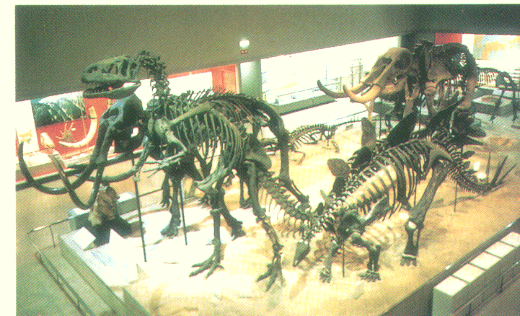
2nd. Exhibition Room
-History of the earth and life-

The earth was born about 4,600 million years ago, and life on the earth appeared about 3,500 million years ago. During the long history of the earth, many change took place and countless living things rose and fell, and then mankind appeared. Nature of Osaka where we live today,too,has been built up through such a long history. In this room, we study the birth of Osaka and trace back to the birth of the Japanese Archipelago and the earth, and furthermore of ups and downs of life.
11. History of Osaka Plain in the last 20,000 years
11A. Fossil whales under the city
11B. History of Osaka Plain in the last 20,000 years
12. The Great Ice Age Marshy spring flowers in the glacial age ; Gigantic deer
13. The Quaternary Period
13A. The age of man The Nojiri-ko Palaeolithic Culture ; Palaeolithic tools of Kinki district
13B. The glacial age Vegetation during the last glacial maximum
13C. The interglacial age and the ancient sea of Uemachi Terrace
14. The Osaka Group
15. The age of mammals
15A. Tertiary flora
Plant fossils from the Japanese Tertiary sediments
15B. Aspects of the Miocene
Inland Sea Mollusks of the Miocene Inland Sea
15C Nijo-san
Miocene volcano at the east of Osaka
15D. The age of mammals
The evolution of horse ; Desmostylus ; Eostegodon, etc.
15E. Green-tuff movement in Early Miocene age
Distribution of the volcanoes in Japan
15F. Japanese coal formed in the nummulitic period
16. Late Cretaceous fossils from the Izumi Mountains of Osaka
17. The age of dinosaurs and ammonites

17A. Aspects of the Mesozoic sea
Ammonites, their phylogeny, physiques, mode of life ; Mesozoic sea animals
17B. Mesozoic land plants
17C. Dinosaurs and allied animals
18. Aspects of the Palaeozoic sea and forest
18A. Inhabitants of the Palaeozoic forest
Palaeozoic plants and amphibians
18B. Mammal-like reptiles
18C. Inhabitants of the Palaeozoic sea
The oldest fossil from Japan ; Precambrian fossils, Trilobites, etc.
[Back to Floor Map | Forward
to 3rd. Exhibition Room]